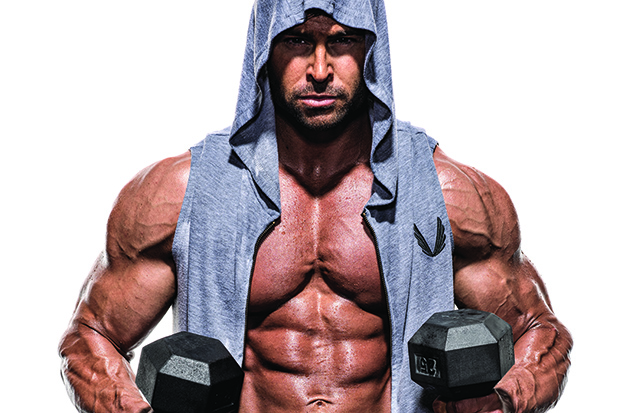


The path of IFBB Pro Jason Poston has not been an easy one, but that has not stopped his success.
It’s a typical balmy late-January day in Long Beach, California. Inside Metroflex Gym, one of Southern Cal’s most celebrated hardcore venues, is Jason Poston, the 32-year-old men’s physique star out of Dallas, Texas. A Colin Farrell look-alike, Poston crawled out of bed at 4:00 a.m., Texas time, to catch a flight to Los Angeles, before making the 25-minute ride from LAX to Long Beach. If that sounds strenuous, you don’t know much about Poston.Anyone who follows the industry knows that the 5’11”, 197-pounder dominated the IFBB men’s physique division in 2014. In one year Poston won four pro contests and was the runner-up in a fifth. In the young sport of men’s physique, there has yet to be a run like what Poston accomplished in 2014. Furthermore, plenty of industry experts felt Poston could have posted another title at the Olympia after finishing behind champion Jeremy Buendia and runner-up Sadik Hadzovic, a lineup so sublime that inaugural champion, Mark Anthony, fell out of the top five.
Names like Buendia and Hadzovic aren’t Jason’s toughest opponents. Not by a long shot. Poston lives with type 1 diabetes, a condition that should make competing in physique contests—to say nothing of winning them—impossible. Instead, Poston gets up every day and outthinks, outworks, and outprepares the disease. Is he winning the fight? We think so!
Lonnie Teper: Whereare you from, and what was it like growing up?
Jason Poston: I was born in Grapevine, Texas. It was a small town, but then it grew quickly when they built the DFW airport there. My lifestyle in my early life was just being active and playing a lots of sports. I played baseball, basketball, football, hockey, and boxing and wrestling.
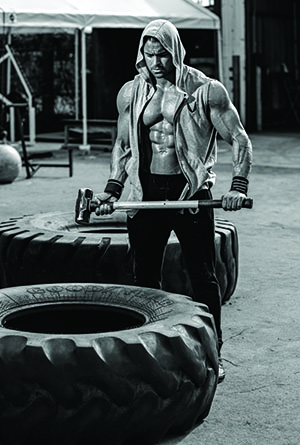 LT: When did you start lifting?
LT: When did you start lifting?
JP: I started lifting seriously at age 19. After high school, a lot of my friends played college sports and it made me aware of how weight training could help build muscle. I wanted to keep up with them, so I started to take a serious interest in weight training myself. I also saw local bodybuilders like Branch Warren and Johnnie Jackson around town, which piqued my interest. I started reading a lot about bodybuilding, magazines like Iron Man. I also read The Encyclopedia of Bodybuilding by Arnold.
Also around that same time, my high school girlfriend dumped me. Whereas we used to go out to eat and just hang out, I used my newfound free time to get a gym membership and spend that time in the gym. I started talking to all the bodybuilders I met about how to build muscle, and I trained really hard. It worked! Everyone around me started noticing the results, even the old girlfriend!
LT: I heard you had a rough patch early in life.
JP: In high school, I was always very social and liked to go out. I was out one night when I was 19 and found out that the same girlfriend was with another guy at a party and trying to make me jealous. I drove over there, speeding, to try to find her. I got pulled over, and because I had had a little to drink, I got arrested. Because I was young and had never had to deal with anything like this before, I got confused about when to show up for community service and ended up in jail. I had to serve 40 days in county jail at age 19. I won’t lie—it was tough in there. It was a life-changing experience that I learned a lot from, and it helped give me the strength in my life to take on many challenges that I’ve faced as an adult. It definitely made me a better person and helped shape a lot of who I am today.
LT: Speaking of strength, you got in cover-model shape for this shoot with Iron Man in the middle of your contest prep for the first-ever Arnold Classic Physique competition. How tough was that?
JP: It was tough, but I looked at it as a challenge. In all types of business, whether it be fitness modeling or being a master of ceremonies, there are frustrating things that get thrown your way. But you just suck it up and do it. I stay in shape year-round, so I didn’t have a lot of fat to lose. But it was a challenge with having to fly, pack my food and clothes, and continue to prep for the Arnold.
LT: Tell us about another challenge in your life. You had just won a model-search competition in 2011 and were prepping for your first NPC contest when you got the devastating news: type 1 diabetes at 28 years old.
JP: I was prepping for my first NPC contest in 2011 when, correct, I was diagnosed with type 1 diabetes. It was confusing for me at first since I lost 15 pounds for no reason in one weekend and over the course of the month lost another 30 pounds despite eating extra food, weight gainers, and supplements. I actually was eating healthier, but it wasn’t working. Once I got the proper treatment I started feeling better immediately. September 1, 2011. The doctor thought my pancreas had stopped working the previous February.
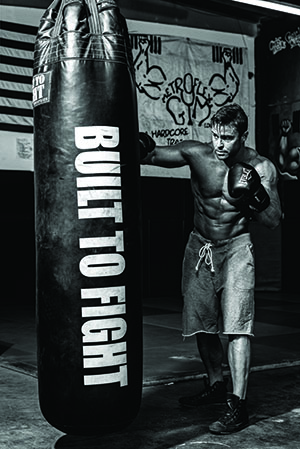 LT: I imagine there were more symptoms in addition to the rapid weight loss.
LT: I imagine there were more symptoms in addition to the rapid weight loss.
JP: Absolutely. When your blood sugar is high, your body doesn’t absorb any nutrients. Your red blood cells start to get coated with sugar. My A1C score [a test reflecting blood sugar levels for three months] was around 16, which is terrible. A normal A1C is six or below. When they put me on insulin, I immediately gained 30 pounds back. I gained 15 pounds during the first weekend they put me on it.
LT: Describe your thoughts when you were first diagnosed?
JP: Like most people my age, I didn’t know much about the disease. So when they told me my blood sugar was 550 [normal range is 80 to 120] I asked what that meant. They told me I could go into a coma at any point and took me straight to the emergency room.They originally thought I was type 2, and they gave me a pill and sent me home. The pill just made me worse. I was so miserable and tired I could barely get out of bed. Then a doctor my grandmother knew called me and told me I was type 1. I went into her office the next day, got a shot of insulin, and felt better within 15 minutes.
LT: The depressing news didn’t stop your game plan. I remember calling out your name in July at the 2012 USAs as one of the new IFBB pros.
JP: Six weeks after I was diagnosed I competed at the Oklahoma Grand Prix. I wasn’t planning on doing that show when diagnosed; I barely knew what physique was. A lot of people around me encouraged me to do this contest. When I was given insulin, I gained 30 pounds in 30 days. I thought, “Wow, my body’s back.” I felt and looked better than ever, so I jumped into it last minute. I competed and finished fourth. I was just happy to be alive. After the contest, the head judge chased my father and me down in the parking lot and told me, “You are exactly what they are looking for. It’s a new division, so it’s hard for the judges right now to figure out how to place but don’t be discouraged.” He told me I should continue to compete because I would do really well. That really motivated me to work even harder. I found out I really enjoyed the competition because it allowed me to promote the lifestyle I already loved. I didn’t compete just to win; I competed because it helped push me to be my best.
LT: Have you always eaten healthy?
JP: I was one of those guys who could get away with eating anything I wanted. I was a personal trainer and ate the typical way: a high-protein, high-carb, and low-fat diet. I was consistent with my supplements, though. I always liked MET-Rx products. Being from Dallas, Johnnie Jackson was with them at the time, so was Troy Aikman. After I started competing, I became much more specific with my diet, counting macros and timing my food.
LT: I hear that pro bodybuilder Colette Nelson has played a major role in your competitive life.
JP: Yes, she has. We are the only two IFBB pros who are type 1 diabetic, and the only two to ever compete in the Olympia. [Editor’s note: Former pro bodybuilder Tim Belknap also lived with diabetes, but never competed in the Mr. 0lympia.] PJ Braun told me to contact Colette because he knew of her medical condition. I emailed her, and she emailed me right back. She taught me how to go low-carb—zero to 50 grams of carbs a day—so you don’t use as much insulin. She also had me switch up the way the doctors were having me take my insulin. The key, in her view, was to use as little of the fast-acting insulin as possible, and that way the blood sugar is not constantly going up and down like a rollercoaster.
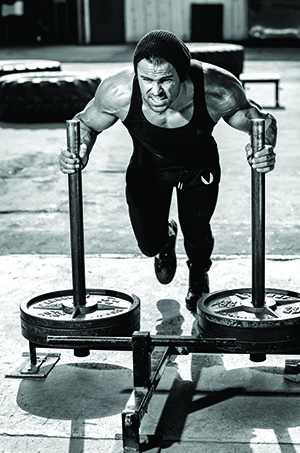 LT: Considering your track record in 2014, with four wins, one runner-up, and the third- place medal at the Mr. Olympia, Colette’s input was inestimable.
LT: Considering your track record in 2014, with four wins, one runner-up, and the third- place medal at the Mr. Olympia, Colette’s input was inestimable.
JP: Absolutely. Diabetes is a controllable disease, but the only way a diabetic can lead a normal lifestyle is by eating a low-carb diet. Sugar and carbs are the enemy now. But because I eat low-carb, I can enjoy more healthy fats like chocolate, spoonfuls of coconut oil and coconut butter. All the other guys are eating chicken and rice.
LT: How has diabetes affected your training?
JP: Diabetes has made intense training and especially athletic training so much harder, but it has sharpened me. I stay on top of my nutrition like a mathematician. Food is now math to me. Every meal is calculated. I’ll will test my blood glucose before, during, and after training to avoid any hypoglycemia. During training I’ll stop and grab a MET-Rx whey isolate protein, which elevates blood glucose safely and slowly, rather than drinking a bunch of sugar, which spikes blood glucose.
LT: What are your favorite foods these days?
JP: I like turkey. I love salmon and all types of exotic fish. Grass-fed steak. I eat Paleo for 95 percent of my meals. I’ll make Paleo pancakes with almond or coconut flour, which are very low-carb and high in fat and fiber. I order all of my Paleo foods from julianbakery.com, which is based in Oceanside, California.I tell people to explore a low-carb lifestyle: high in protein, high in fiber, high in vegetables, and high in healthy fats. My message is to keep it at 150 grams of carbs a day or less. I’m also a big macronutrient counter. You don’t need to count your calories as much as macros.
LT: What’s a typical day of eating like?
JP: Five meals a day I eat 50 grams of protein, 10 grams fiber, 15 to 25 grams of fat, and a ton of dark green vegetables. Pre-workout I eat 50 grams of protein and 50 grams of carbs. I always have carbs pre-workout but never after a workout. My philosophy is carbs are a fuel for intense exercise, so they are better used to boost performance and strength rather than replenish energy. I eat healthy fats, fiber, vegetables, and protein for the other six or seven meals of the day. Before a show I adjust the amount of food depending on how I look.
LT:Are you able to do much volume when you’re low-carb?
JP: I always try for 17 or more sets for upper body and 20 sets for leg days. I’ve learned I can get a lot of energy from fats. It’s a much more reliable source of energy and you feel consistent energy and you even get better pumps sometimes.
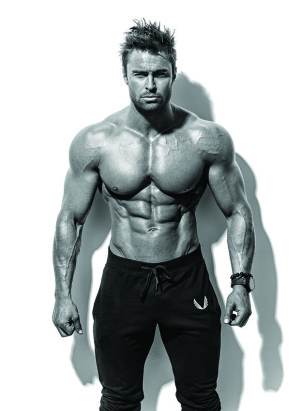 LT: What does your typical workout routine look like?
LT: What does your typical workout routine look like?
JP: I train in the evening six days a week. I split all my body parts separately with arms having their own day. I tend to do legs twice a week, and close to a show, chest replaces legs twice a week. If I feel like my back is fresh, I’ll do it again that week. I like to keep it instinctive. I never do the same routine more than once. I keep the same exercises for four to 12 weeks at a time, but rotate and arrange them based on reps and sets. I’ll do more compound lifts and less isolation for eight weeks, then more isolation and less compound movements when calories are low. Right now I’m doing a lot of cardio. I want to take my physique to another level. Three times a week I end my workout with 15 minutes of HIIT training like boxing, jump rope, hill runs, or box jumps. Anything to keep my athleticism and explosiveness.
LT: You had a terrific year in 2014, both on and off the stage. Like landing a contract with MET-Rx.
JP: Yes. MET-Rx had shown an interest in signing me before, but I was under contract with another company. I had to wait a month before I was out of my contract and then signed with them a few weeks before the Olympia. I really like their Ultramyosyn Whey. My daughter loves the MET-Rx pancakes.
LT: Men’s physique is new to the industry, and some people still wonder what the judges are looking for. Even the training style for the top guys is still evolving.
JP: To me, the perfect physique in this division has very broad, rounded shoulders, and a full chest like Arnold or Frank Zane. The back should have a V-taper—as wide as a smaller bodybuilder down to a small waist. To see a guy with rounded, 3-D action figure–like muscles with small attachments looks absolutey incredible.
I enjoy the presentation aspect of physique, but I do wish they’d add another element where you could squeeze and show a little of your definition and graininess. Maybe just for one pose. Showing muscle in a relaxed state is incredibly hard. You either have the shape or you don’t.
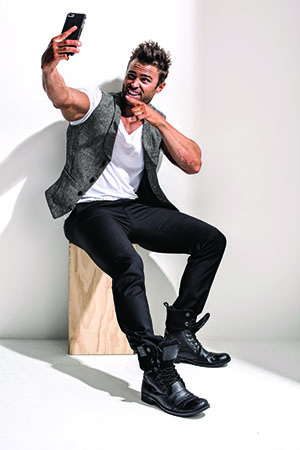 LT: What is your relationship like with your fans on social media?
LT: What is your relationship like with your fans on social media?
JP: I’ve been a trainer and coach for a long time. Being able to impact and connect with my fans on a global scale allows me to feel that same fulfillment, to watch them grow. I literally wouldn’t be able to compete without the positivity and support I get in messages and emails. I am blown away, and I get very emotional sometimes. It’s just amazing!
LT: Do you ever run into stalkers or haters?
JP: I have had people send me awkward things in the mail, which is kind of scary. I had someone send me her “favorite stuffed animal” and she was an adult! I had someone send me their used workout shirt that was used and kind of smelly. The scariest thing is when people try to contact my girlfriend or my family through lying just to get to me. People can be really different on social media, but I don’t let it get to me. I tend to feel bad for them and want to help them. I try to return all hateful comments with a smile. I don’t get many, but I believe that all hate can be killed with love. The good thing is that I mostly get positive things from fans. I’ve had so many people send me amazing artwork of me that I cherish and have hung up in my office. I have received so many letters and messages encouraging me and supporting me, I really don’t even spend time thinking about haters.
LT: What does it mean to you to be on the cover of the new Iron Man?
JP: To see myself on the cover of a magazine I grew up reading is something I will only be able to describe when I see it. I will gather with family and share it with them. That’s what it’s all about: sharing your accomplishments with the people who helped get you there.







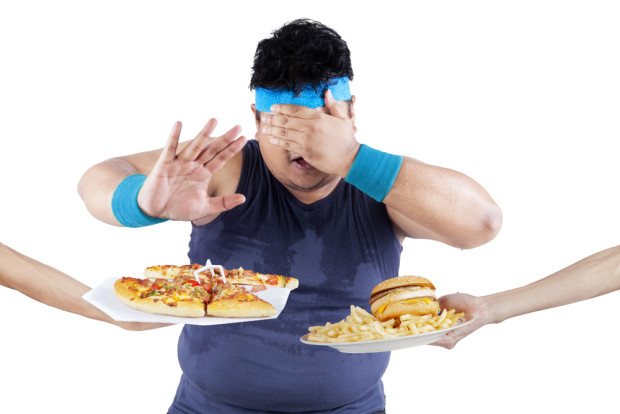





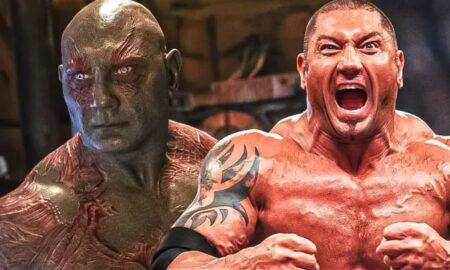
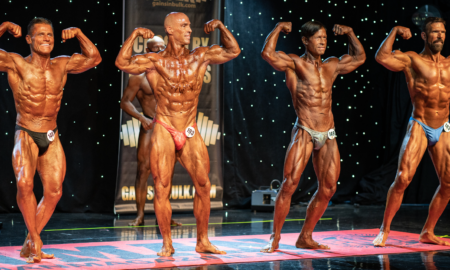
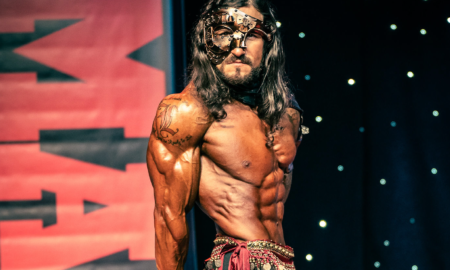
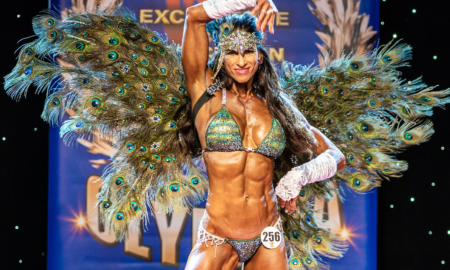
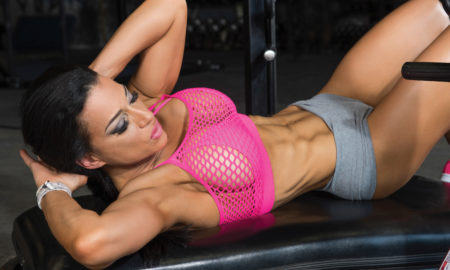
You must be logged in to post a comment Login